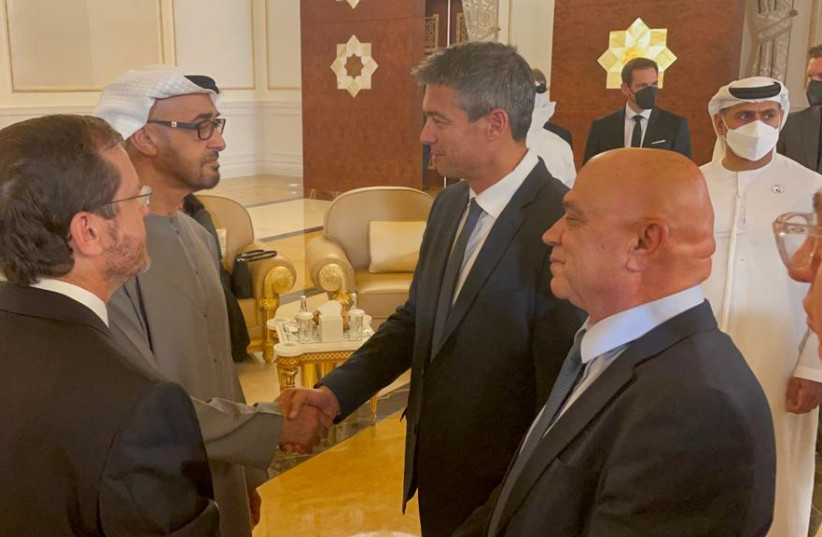Israeli President Isaac Herzog and his Palestinian Authority counterpart Mahmoud Abbas paid separate visits to the United Arab Emirates Sunday to offer their condolences on the passing of its President Sheikh Khalifa bin Zayed.
“Sheikh Khalifa’s passing is a great loss for his nation," Herzog said. It was during Sheikh Kalifa's tenure in office that the UAE, under the auspices of the former Trump administration, normalized ties with the Jewish state in 2020.
Herzog is among a host of dignitaries — including German President Frank-Walter Steinmeier, Regional Cooperation Minister Esawi Frej and Communications Minister Yoaz Hendel — descending this week on the UAE to offer condolences to its new leader Sheikh Mohammed bin Zayed al-Nahyan on the death Friday of his half-brother Sheikh Khalifa in a show of support to a key regional player.
"I believe and hope that his [Sheikh Kalifa's] legacy—a legacy of peace, a legacy of friendship between the nations of this region, a legacy of progress and prosperity—will lead to flourishing and the continued development, progress, and peace of the Middle East," Herzog said.

“In a global reality of wars, interests, and conflicts—friendship has truly great value, and it is measured also, and perhaps in particular, in moments of sorrow and pain.“The partnership between our countries is an asset for us and for the whole region, and it has been built and is still being built by bold and groundbreaking leaders, of whom the late Sheikh Khalifa was one," Herzog said.
He expressed these same sentiments to Sheikh Mohammed, as well as congratulated him on his ascension to the presidency to replace his half-brother.
Sheik Mohammed, now ruler of wealthy Abu Dhabi emirate, steered the Western-allied Gulf state, an OPEC oil producer and regional business hub, for years before being named the UAE's third president by a federal supreme council on Saturday.
French President Emmanuel Macron, whose country holds lucrative business and military ties with the UAE, told Sheikh Mohammed in Abu Dhabi that the UAE could "count on France's friendship" and discussed the Ukraine conflict, the Elysee said.
US President Joe Biden, whose administration has had fraught ties with the UAE and Saudi Arabia, will be represented by Vice President Kamala Harris, due to visit on Monday.
Several Arab leaders paid respects on Saturday. Saudi Arabia's crown prince, whose father King Salman entered hospital a week ago, sent a delegation.
Sheik Mohammed, known as MbZ, has been a driving force in Middle East politics, championing Saudi Crown Prince Mohammed bin Salman in the West as he rose to power and combating political Islam, seen as a threat to Gulf dynastic rule, around the region.
MbZ deepened ties with Russia and China as Gulf states increasingly questioned the regional commitment of the traditional security guarantor the United States. Strains in US-Emirati ties were highlighted by the Ukraine conflict as Gulf states refused to side with Western allies in isolating Russia.
After years of enmity, Abu Dhabi has also moved to engage with Iran and Turkey as the UAE doubles down on economic growth amid rising regional competition and a global push away from hydrocarbons, the lifeblood of Gulf economies.
